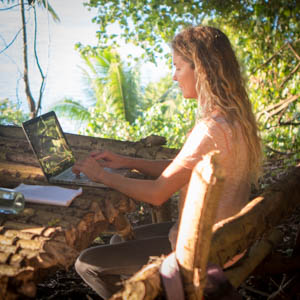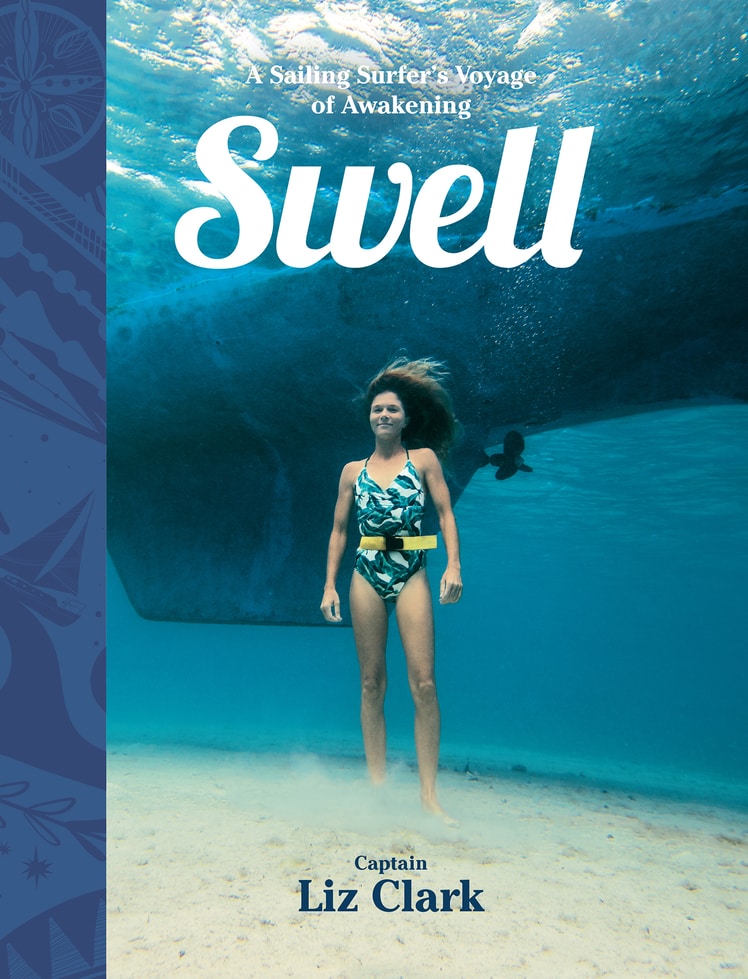Long hours in paradise…

Rocky and Poppi do plenty of fishing themselves…
An atoll away from the site of my ‘big cry’, I found a little more reason for hope…Here was an atoll that had been inhabited by a single family for many generations. I spent some time getting to know Gaston and Valentine, 2 of the 5 people that still permanently live there. Working with some regional environmentalists, they’d agreed to dedicate their atoll as a part of a new program in French Polynesia called “BIOSPHERE”. They are attempting to institute marine reserves in select areas of each archipelago.

Gaston & Val…loading the last of their copra.
Gaston and Valentine’s bay is a perfect cut in the reef for passing sailboats to find shelter, so Gaston has installed 15 moorings in their bay to prevent damage to the coral from the anchors of visiting sailboats. Fishing is limited, too–mating seasons and size limits are respected in all sorts of sea creature harvesting. In turn, the lagoon is rich and teeming with mature fish of a variety of species. Life seems so resilient when given a chance!

Firi firi, traditional Puamotu Sunday bread in the making.

Umo Umo, the rescued frigate, gets his dailies.

Mariah, the Napoleon wrasse, waiting for hers…
These two are a truly hardy duo. Life really gets back to the basics out here. It was refreshing to see how relatively self-sufficient and sustainably they live. Valentine’s family has inhabited this atoll for as many generations as she can trace. She doesn’t want to move to Papeete, like many outer island people do, as she claims people in the city have become ‘too spoiled and have forgotten the beauty of their land.’ Her motu fills her with daily joy. Of anyone I know, Valentine embodies ‘living simply’. But don’t confuse ‘living simply’ with living easily! Atoll life is hard work! Only hard work and respect for nature keeps food on their plates, clean water in their rain catchments, and the relentless entropy of tropical regions at bay. There is no phone, no village, no corner store (…but they do have satellite television!?! ) Every meal must be prepared from scratch, every drop of water must be carried or pumped from the catchments, every fish must be caught, every leaf must be raked and burned, the pigs and dogs must be fed (and their pet Napoleon wrasse and frigate bird!), and the vegetable garden tended. And every day it starts all over again…

The pigs munching on lobster scraps.
Without easy access to buy things, I noticed that things we would consider trash, like water bottles and rice bags, get used thoroughly and then reused again for something else–a habit that our consumer culture and marketing schemes teach us NOT to do!? Every six months or so, a cargo ship makes a special stop to deliver them flour, rice, sugar, cooking oil, motor oil, gasoline for the outboard, diesel for their generator, and a select few other items. But other than that, nature provides. If they drink a coconut, the coconut meat goes to the pigs. Their food scraps or extra fish from the fish trap feed the bird, the wrasse, and the dogs. They really understand that they must live within the limits of nature, without taking too much. If only they had a plastic-to-oil machine, virtually nothing would go to waste!

What if we all used things as thoroghly as this scrub brush?!

Work hard, eat well…a good philosophy!
Valentine, with her relentless cheer, cooks up meals that have become legendary among passing cruisers. Her wit and resourcefulness stem from an a ingrained Puamotu toughness that she prides herself in…Beaming between kneading the bread dough, she recounts stories of growing up without rice and flour, and learning to dive to depths of over 70 feet with her father, who was one of the most respected natural pearl divers of his time. “My father was afraid to die before he taught me how to live,” Valentine explained. Unfortunately, he died before he was 50, due to the deep diving…But I seemed to think that her father was resting at peace. From what I gathered, Valentine had been paid attention.




2 Comments
Kevin
December 19, 2011That pig food looks delicious!
Wayne
December 19, 2011like!